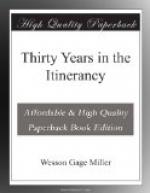the earth, so beautifully set forth in our Declaration
of Independence, and teaching the great lesson
of universal equality and universal freedom,
forms the corner-stone of our institutions.
But a plague spot is found in the opposing doctrine
of caste and privileged classes, which finds illustration
in American slavery. This war of principles has
already culminated in a collision at Fort Sumter,
and it would be contrary to all history to arrest
the tide of war at this stage. The antagonism
is too direct, and the conflict too heated to
quench the flame till rivers of blood shall pass
over it. The act of the South in firing on Sumter
is none other than a rebellion, and that of the
most inexcusable and wicked character, against
the best government on earth; and I am free to
confess that I am filled with horror when I contemplate
the result of this suicidal act on their part, an
act that must lead to years of war, as far as
human ken can see, and the most fearful desolations
in its train. But, gentlemen, there is no
alternative. The glove is thrown to us,
and we must accept it. If our principles are right,
and we believe they are, we would be unworthy
of our noble paternity if we were to shrink from
the issue. Let there, then, be no shrinking
from the contest. The battle is for human
liberty, and it were better that every man should go
down, and every dollar be sacrificed, than that
we should transmit to the coming millions of
this land other than a legacy of freedom.
Were it not that good men have gone down into
the dust and smoke of the battle, there would not be
to-day a government on the face of the globe under
which a good man could well live. And since
God in his Providence has brought us to this
hour, I trust that by his help we shall not prove
unworthy of the trust—the noblest ever given
to man—committed to our keeping.
There can be no question as to the result.
We shall triumph, and with the triumph we shall win
a glorious national destiny.”
The next Conference session was held in Fond du Lac
Sept. 18, 1861, Bishop Baker presiding. The session
was one of unusual excitement. The war had been
begun, the terrible Bull Run defeat had occurred, and
already seven regiments of our brave boys had gone
to the front. And with the seventh, one of our
own members, Rev. S.L. Brown, had gone as Chaplain,
while several others were either in the ranks or looking
in the same direction. In the matter of furnishing
men, Wisconsin was already ahead of the call made
upon her, but such was the devotion of her people
to the Old Flag, that ten other regiments could have
been sent during the year.
At this session, the Conference adopted a very able
Report, written by Rev. J.H. Jenne, on the state
of the country, showing a deep interest in the issue
before the Nation, and pledging her unwavering support
to the Government.
Brother Jenne entered the traveling connection in
Maine, and came to the Wisconsin Conference by transfer
in 1856. His first appointment was Agent of the
Lawrence University. His next appointment was
Presiding Elder of Appleton District, where he remained
four years. His subsequent appointments have
been Janesville, Janesville District, Lake Mills, Hart
Prairie, Allen’s Grove, Union Grove, Lyons, and
Waupun. At the present writing he is on his second
year at the last named place.




